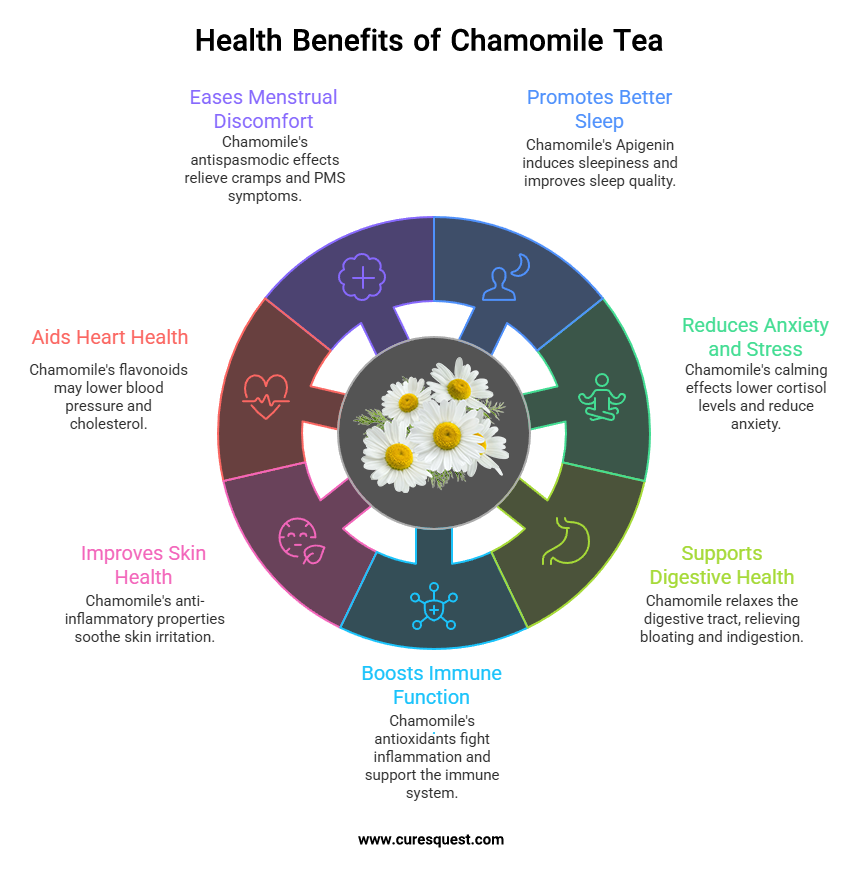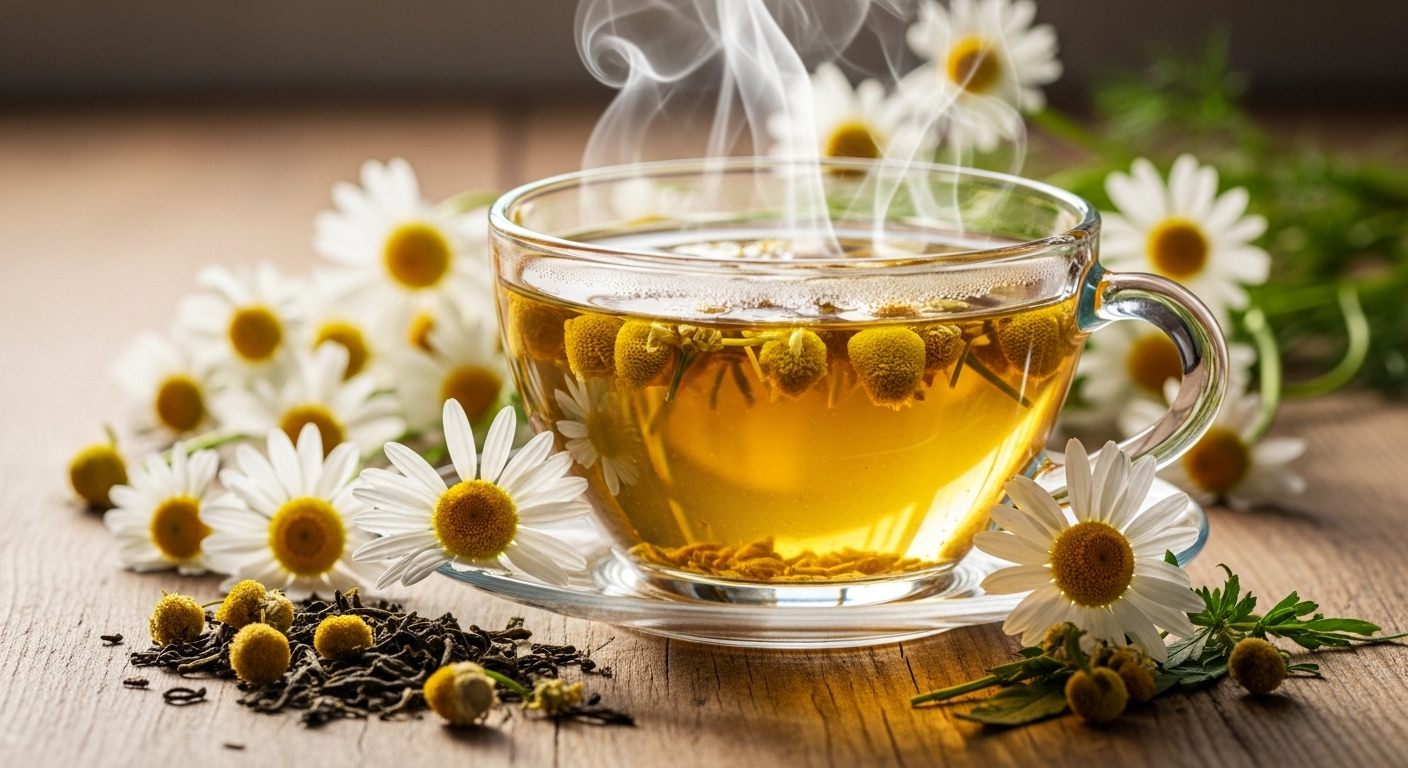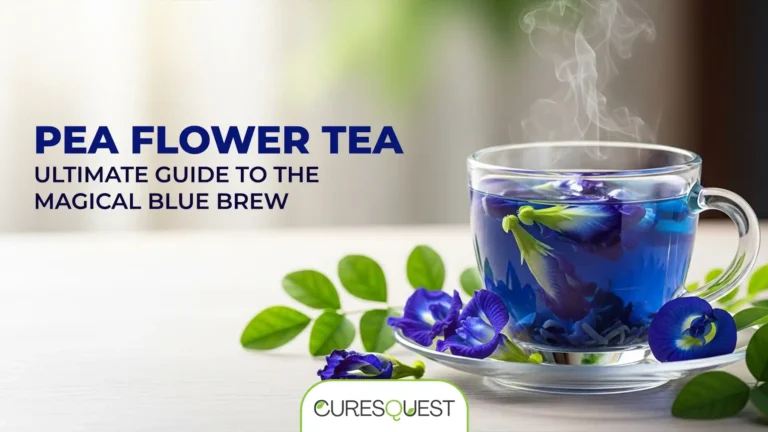Imagine winding down after a long day with a warm, fragrant cup that not only relaxes you but also packs a punch of health perks. That’s the magic of chamomile tea a timeless herbal brew cherished for centuries. Derived from the daisy-like flowers of the chamomile plant (Matricaria recutita or Chamaemelum nobile), this caffeine-free tea has roots in ancient Egyptian, Roman, and Greek medicine, where it was used to treat everything from fevers to skin conditions. Today, chamomile tea remains a go-to for those seeking natural wellness solutions.
But what makes chamomile tea stand out in a sea of herbal options? It’s loaded with antioxidants like apigenin and chamazulene, which contribute to its anti-inflammatory and calming effects. Whether you’re battling stress, insomnia, or digestive woes, incorporating chamomile tea into your routine could be a game-changer. In this comprehensive guide, we’ll dive deep into its benefits, how to brew it perfectly, creative recipes, potential downsides, and more. By the end, you’ll be equipped to make chamomile tea a staple in your daily life. Curious about trying it? Keep reading to uncover why millions swear by this gentle elixir.
What Is Chamomile Tea?
Chamomile tea is an infusion made from the dried flowers of the chamomile plant, a member of the Asteraceae family. There are two main types: German chamomile (Matricaria recutita), which is more common and potent, and Roman chamomile (Chamaemelum nobile), known for its sweeter flavor. Unlike true teas from the Camellia sinensis plant, chamomile is an herbal tisane, meaning it’s naturally caffeine-free and safe for evening consumption.
Historically, chamomile has been revered for its medicinal properties. The ancient Egyptians dedicated it to the sun god Ra for its healing powers, while in Europe, it was a folk remedy for ailments like colds and anxiety. Modern science backs many of these claims, attributing benefits to compounds like flavonoids and terpenoids. If you’re new to herbal teas, chamomile is an excellent starting point-mild, apple-like in taste, and versatile. Ready to explore its health impacts? Let’s move on.
Top Health Benefits of Chamomile Tea
Chamomile tea isn’t just a bedtime ritual; it’s a wellness booster supported by research. Here are seven key benefits that might surprise you:
- Promotes Better Sleep: Apigenin, an antioxidant in chamomile, binds to brain receptors that induce sleepiness, making it ideal for insomnia. Studies show sipping chamomile tea before bed can improve sleep quality, especially for those with mild anxiety.
- Reduces Anxiety and Stress: Its calming effects mimic mild sedatives, helping lower cortisol levels. One study found it effective for generalized anxiety disorder when consumed regularly.
- Supports Digestive Health: Chamomile relaxes the digestive tract, easing issues like bloating, gas, and indigestion. It’s particularly helpful for IBS symptoms.
- Boosts Immune Function: Rich in antioxidants, it may help fight inflammation and support the immune system, potentially reducing cold duration.
- Improves Skin Health: Topical or ingested chamomile can soothe irritations like eczema due to its anti-inflammatory properties. Some use cooled tea as a compress for wound healing.
- Aids Heart Health: Flavonoids may lower blood pressure and cholesterol, reducing heart disease risk.
- Eases Menstrual Discomfort: Its antispasmodic effects can relieve cramps and PMS symptoms.
These benefits make chamomile tea a versatile ally for everyday health. If you’re dealing with sleep issues, why not brew a cup tonight? For more on herbal remedies, check our guide on [/best-herbal-teas-for-relaxation].

How to Brew the Perfect Cup of Chamomile Tea
Brewing chamomile tea is simple, but getting it right enhances flavor and benefits. Follow this step-by-step guide:
- Gather Ingredients: Use 1-2 teaspoons of loose dried chamomile flowers or one tea bag per cup. Opt for organic to avoid pesticides.
- Heat Water: Bring fresh water to a boil (around 200°F/93°C), then let it cool slightly boiling water can make the tea bitter.
- Steep: Pour hot water over the chamomile in a mug or teapot. Cover and steep for 5-7 minutes for optimal strength.
- Strain and Serve: Remove the flowers or bag. Add honey or lemon if desired, but enjoy plain to savor its natural sweetness.
- Tips for Best Results: Use filtered water and a covered vessel to retain essential oils. Steep longer for stronger benefits, but not over 10 minutes to avoid bitterness.
This method ensures a soothing, flavorful brew. Experiment with cold-brewing for iced versions in summer. Interested in more brewing tips? Visit [/tea-brewing-basics].
Delicious Chamomile Tea Recipes to Try
Take chamomile beyond basic with these easy recipes. They’re perfect for variety and added health boosts.
- Honey Chamomile Latte: Brew strong chamomile tea, froth warm milk, mix with honey, and sprinkle cinnamon. Ideal for cozy evenings.
- Chamomile Lemon Iced Tea: Steep chamomile with lemon slices, chill, and add mint. Refreshing and digestive-friendly.
- Chamomile Turmeric Golden Milk: Combine brewed chamomile with milk, turmeric, ginger, and coconut oil for an anti-inflammatory twist.
- Lavender Chamomile Blend: Mix chamomile with lavender and mint for extra relaxation.
- Chamomile Hot Toddy (Non-Alcoholic): Add lemon juice, honey, and a dash of cinnamon to hot chamomile , its great for colds.
These recipes are quick and customizable. Try one this week and share your twist in the comments! For more ideas, see [/herbal-tea-recipes].
Potential Side Effects and Precautions
While generally safe, chamomile tea has potential downsides. Be aware of:
- Allergic Reactions: Those allergic to ragweed or daisies may experience itching, swelling, or anaphylaxis.
- Drowsiness: Its sedative effects can cause sleepiness, so avoid before driving.
- Nausea or Vomiting: High doses might upset the stomach.
- Interactions: It may amplify blood thinners or sedatives—consult a doctor if on medications.
Pregnant women should limit intake, as it might stimulate contractions. Start with one cup daily and monitor. For personalized advice, talk to a healthcare pro.
Chamomile Tea vs. Other Herbal Teas: A Comparison
Wondering how chamomile stacks up? Here’s a quick table:
| Herbal Tea | Key Benefits | Caffeine | Best For | Flavor Profile |
|---|---|---|---|---|
| Chamomile | Sleep aid, anti-anxiety, digestion | None | Relaxation, bedtime | Mild, apple-like |
| Peppermint | Digestion, headache relief | None | Gut health, energy | Minty, refreshing |
| Ginger | Nausea relief, anti-inflammatory | None | Motion sickness, immunity | Spicy, warming |
| Hibiscus | Blood pressure lowering, antioxidants | None | Heart health | Tart, fruity |
| Green Tea | Metabolism boost, antioxidants | Low | Weight management | Grassy, vegetal |
Chamomile excels in calming effects, unlike stimulating options like green tea. If stress is your issue, chamomile wins. Explore our [/herbal-tea-comparisons] for deeper dives.

How to Choose and Buy Quality Chamomile Tea
Select whole flowers over crushed for freshness. Look for organic, non-GMO labels. Brands like Traditional Medicinals or Twinings are reliable. Store in an airtight container away from light. For premium options, check farmers’ markets or online retailers. Pro tip: Loose leaf offers better potency than bags. Ready to stock up?
Conclusion
Chamomile tea is more than a drink, it’s a natural path to better sleep, less stress, and improved health. With its rich history and science-backed benefits, it’s easy to see why it deserves a spot in your pantry. Start small, brew mindfully, and enjoy the transformation. What are you waiting for? Grab some chamomile tea today and experience the calm. Subscribe for more wellness tips!
FAQ
What are the main benefits of drinking chamomile tea?
Chamomile tea promotes sleep, reduces anxiety, aids digestion, and supports immunity through its antioxidants.
Is chamomile tea safe to drink every day?
Yes, for most people, 1-3 cups daily is safe, but monitor for allergies or interactions.
Can chamomile tea help with weight loss?
Indirectly, by improving sleep and reducing stress, which can curb emotional eating, but it’s not a direct fat-burner.
How long should I steep chamomile tea?
Steep for 5-7 minutes for the best flavor and benefits.
Is chamomile tea good for skin?
Yes, its anti-inflammatory properties can soothe skin when drunk or applied topically.









